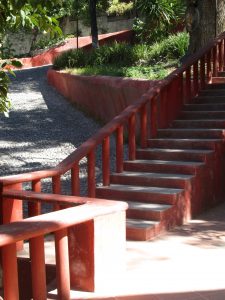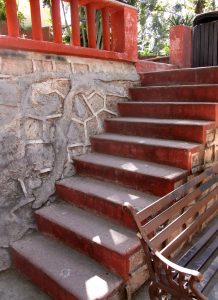Zorba the Zebra, my newest handmade puppet, taught a class recently to the little niños at Aprendizaje del Ingles here in San Miguel De Allende about some of the words in English that begin with the letter “z.”

We covered: zenith, zero, zigzag, zipper, zoom, and zucchini. On their worksheets the kids drew a picture representing each word – to the best of their ability – then colored in their pictures as they wished.
My personal favorite of these six z-words is zigzag, which happens to be the same word in both English and Spanish. This is unusual in my experience because Spanish doesn’t seem to bend to English much. Even the French, who’ve got to be among the most linguistically chauvinistic folks in the world (understandably, I feel), have buckled a bit. Take the English word “weekend,” for instance. In French it’s also “weekend.” Here in Mexico, it’s “el fin de semana,” (the end of the week).
The word zigzag itself, I just learned, originates from the German word “Zickzack,” meaning “symbolic of alternation of direction.” Today “zigzag” means “a line or course having abrupt alternate right and left turns” or “veering to right and left alternately.”
I think I feel a personal affinity for the word zigzag because it represents the path of my life – two steps forward, one-and-a-half steps back, then side to side, a little like a jaggedy dance (cha-cha?). Lots of other people appear to climb their ladders of success or their respective learning curves pretty much straight up. But I? Not so.
This has always been the case for me, so I should be used to my zigzaggy journey by now. But I’m not. I still sometimes get discouraged.
Take my efforts at Spanish language acquisition, por ejemplo (for example). When friends ask me how I’m progressing, my answer is always “glacially.” My long-suffering Spanish teacher, Edith, rolls her eyes and mutters “por favor, Bonnie!” She tells me to practice more. I counter with, “Where?” She tells me this town is filled with people who speak Spanish. I respond, “But not with me. They speak English with me.” She and I go round and round.
During our last lesson I announced, like the stubborn five-year-old I guess I still am somewhere inside, “No me gusta verbos (I don’t like verbs). Could we do something else today?” This announcement surprised even me because I used to tell my English 101 students at UNM-Taos: “The verb is the most important word in any sentence. Verbs give muscle, movement, life to your writing.”
Edith knows how to handle me. “You’ve got to learn verbs,” she said firmly.
Similarly, my efforts to improve at sketching are definitely zagging. Every sketch I do looks like it was done by the stubborn five-year-old with her hands on her hips who refuses to learn Spanish verbs. (Some of the little niños in my class at Aprendizaje draw better than I.) Last Tuesday, when I joined the Urban Sketchers group at the El Chorro Cultural Center, I climbed to the top level and took a stab at sketching/painting the vista:

Which just doesn’t do the view justice.
So, for the past few days I’ve been discouraged.
I knew I needed to get a grip, give myself a talking-to (as I frequently have to do), remind myself that my life has been filled with zigzags. It’s been one long jaggedy dance.
The steps up to the El Chorro Cultural Center, high on a hill near el centro, follow a zigzag pattern. They’ve given me a concrete metaphor (for any endeavor) to help snap me out of my slump: Climb a little, rest a little on one of the several grand terrazas, find the next set of stares, climb some more, and repeat the process until, breathless, you’re at the top and can see the whole view. If you choose to sketch the vista, it doesn’t have to be perfect. It’s just a memory. It’s just proof that you tried.




charming, and i even learned a new spanish word—zigzag!
Thanks, Pat! Yes, aren’t they the BEST words? (The ones that are the same.) They’re the ones we’re less likely to forget.
My life has been more like the Hokey Pokey. Especially the part where you turn yourself around. It’s all good. I gave up on Spanish. I throw a bunch of words together in a word salad and let the listener sort them out. Anything in the past is indicated with a wave over my shoulder. And then there is the online translator. I needed to ask the maid to go to the store, and now I know “podrias ir a . . .’ If I can remember that I can ask all kinds of things. “If I can remember that” is the operative part of the sentence.
Ah, Toni dear, you’ve given me my laugh for the day! Thanks so much! 🙂
I love the way Toni indicates past tense! It’s darling!
This was a sweet piece, Bonnie. I especially liked the ending, the part about trying. Taking the time to make a drawing or painting plants the experience more deeply in the memory than just looking at a photo. Looks like a beautiful place, even from your drawing, which gives a sense of the expanse, with humans’ colorful touches in the distant rooftops.
Thank you, dear Barb, for your thoughtful comment. Yes, the view here — much like in Taos — is expansive, with rolling mountains in the distance. Beautiful. And, yes, I use the same method for indicating the past tense in Spanish as Toni does. Mexicans are so good-natured and tolerant; they just smile and nod. They get it.
Bonnie, I too struggle with espanol and quit my lessons. I commend you for sticking with it! I have regressed-not good!
Let’s plan a Spanish only lunch soon!
Kate
Kate dear, I fear if we had a Spanish-only lunch it would be very quiet! 🙂 We both must stick with our Spanish lessons, one way or another.
Bonnie, you may not realize it, but you are an inspiration to me, and to so many others. So let me suggest that you learn to say that in Spanish, and repeat it to yourself as you ascend the steps. Keep up your essential work with children. They will remember you 50 years from now!
Marge dear — maybe what I’ll do is memorize this comment from YOU and repeat it to myself as I climb my learning curves! Thank you so much for your kind and encouraging words.
Love your persistence.
Thanks, Lyn. Stubborn and persistent, that’s me! 🙂
Oh Bonnie, I know so well what you are feeling! We have lived 1/2 time in Cozumel for 10 years. So often, after listening to my pathetically slow speech for a sentence or two, the listener will say that it would be alot easier for us both we just used English. They are trying to be kind but it does make it difficult to practice. My husband does so much better because his humor is universal. Mine suffers in the translation! I can tell just by reading your posts that you are learning more than you think! Keep it up and climb those stairs!
Thanks so much for sharing your experience, Peggy! Yes, the kind and patient Mexicans here in San Miguel de Allende enjoy “practicing their English” with me. Hence, my Spanish progress remains glacial. But I’m soldiering on…